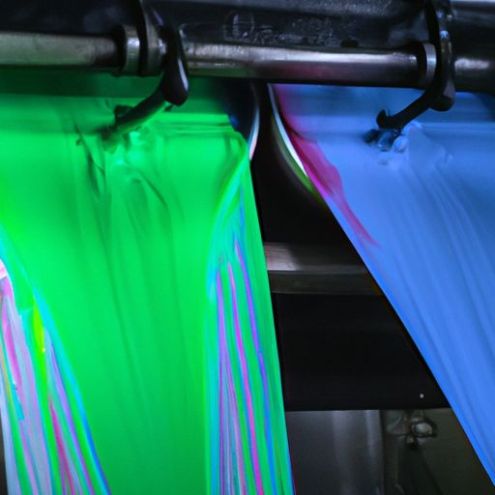Table of Contents
Polyester Screen Printing: A Guide to Achieving High-Quality Results
Polyester screen printing is a popular method for creating high-quality designs on t-shirts and other textiles. This technique involves using a special type of screen paste that is designed to adhere to polyester Fabric. By following a few key steps and using the right materials, you can achieve professional-looking results with polyester screen printing.
 One of the most important factors to consider when screen printing on polyester is the type of Ink you use. Water-based resin ink is a popular choice for polyester screen printing because it is durable, flexible, and provides vibrant colors. This type of ink is also environmentally friendly, making it a great option for eco-conscious printers.
One of the most important factors to consider when screen printing on polyester is the type of Ink you use. Water-based resin ink is a popular choice for polyester screen printing because it is durable, flexible, and provides vibrant colors. This type of ink is also environmentally friendly, making it a great option for eco-conscious printers.
When preparing to screen print on polyester, it is essential to properly prepare the fabric. Make sure to wash and dry the fabric before printing to remove any dirt, oils, or other contaminants that could affect the adhesion of the ink. Additionally, consider using a pre-treatment solution specifically designed for polyester fabric to ensure optimal ink adhesion.
To achieve crisp, clear designs with polyester screen printing, it is important to use a high-quality screen. Choose a screen with a mesh count appropriate for the level of detail in your design. A higher mesh count will provide finer detail, while a lower mesh count is better suited for bold, graphic designs.
When printing on polyester, it is crucial to use the correct squeegee pressure and angle to ensure even ink coverage. Apply even pressure as you pull the squeegee across the screen, making sure to maintain a consistent angle throughout the printing process. This will help prevent smudging and ensure that your design looks sharp and professional.
Another key consideration when screen printing on polyester is the curing process. Polyester fabric requires a higher curing temperature than other types of fabric, so be sure to follow the manufacturer’s recommendations for curing the ink. This will help ensure that the ink bonds properly to the fabric and resists fading and cracking over time.
In addition to using the right materials and techniques, achieving high-quality results with polyester screen printing also requires attention to detail. Take the time to properly align your screens and register your designs to ensure that each print is consistent and accurate. Pay close attention to ink coverage and saturation to avoid under- or over-inking your prints.
Overall, polyester screen printing can be a rewarding and profitable endeavor when done correctly. By using the right materials, following proper techniques, and paying attention to detail, you can achieve professional-looking results that will impress your customers. Whether you are printing t-shirts, tote bags, or other textiles, polyester screen printing offers endless possibilities for creating custom, eye-catching designs.
Water-Based Resin Ink: The Eco-Friendly Solution for Textile Screen Printing
Textile screen printing has long been a popular method for creating custom designs on clothing, Accessories, and Other Fabric items. Traditionally, screen printing involved the use of solvent-based inks that contain harmful Chemicals and emit volatile organic compounds (VOCs) into the Environment. However, with the growing concern for environmental sustainability, there has been a shift towards using water-based inks in textile screen printing.
Water-based resin ink is a type of ink that is made from a water-based resin binder, pigments, and additives. Unlike solvent-based inks, water-based resin inks do not contain harmful chemicals or VOCs, making them a more eco-friendly option for textile screen printing. These inks are also easier to clean up and do not require harsh chemicals for removal, further reducing their environmental impact.
One of the key benefits of using water-based resin ink in textile screen printing is its ability to produce vibrant and long-lasting colors. The water-based resin binder allows the ink to adhere to the fabric fibers more effectively, resulting in a more durable and fade-resistant print. This makes water-based resin ink an ideal choice for creating high-quality designs that will stand the test of time.
In addition to their environmental and performance benefits, water-based resin inks are also safer to work with compared to solvent-based inks. Solvent-based inks can release harmful fumes during the printing process, posing health risks to workers and the environment. Water-based resin inks, on the other hand, have a lower odor and are non-toxic, making them a safer option for both the printer and the end user.
Another advantage of water-based resin ink is its versatility. These inks can be used on a wide range of fabrics, including cotton, polyester, and blends. They can also be used for both light and dark-colored fabrics, making them a versatile choice for a variety of printing projects. Whether you are printing t-shirts, tote bags, or other fabric items, water-based resin ink can help you achieve professional results.
When using water-based resin ink for textile screen printing, it is important to follow proper printing techniques to ensure the best results. This includes properly preparing the screen, using the right mesh count, and curing the ink at the correct temperature. By following these guidelines, you can achieve crisp and vibrant prints that will impress your customers.
In conclusion, water-based resin ink is a sustainable and eco-friendly solution for textile screen printing. Its ability to produce vibrant colors, durability, Safety, and versatility make it an ideal choice for creating custom designs on fabric. By making the switch to water-based resin ink, you can reduce your environmental impact while still achieving high-quality results. So why not make the switch today and start printing with water-based resin ink for your next textile screen printing project?

